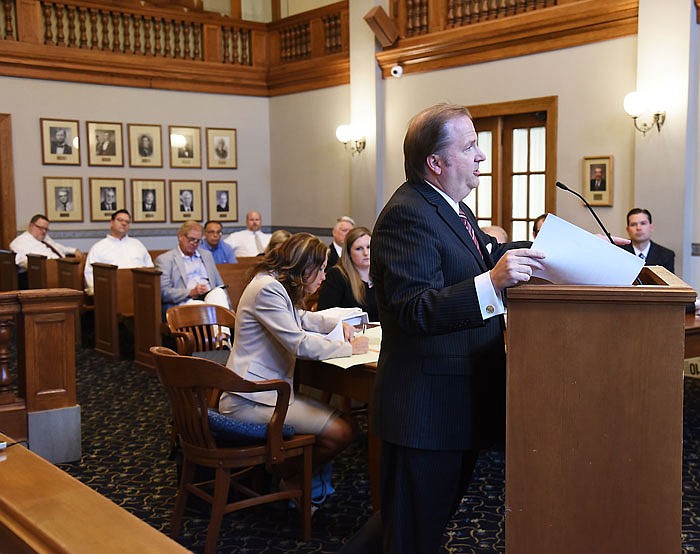If the election were held today, Missourians would be voting on the "Raise Your Hand 4 Kids" proposed constitutional amendment to raise Missouri's tobacco taxes and use the money to improve early childhood education and health programs.
But lawyers for the proposal's opponents argue Secretary of State Jason Kander violated statutory and constitutional provisions when he certified the issue to be on the Nov. 8 general election ballot - and Friday afternoon, they were in court asking Cole County Circuit Judge Jon Beetem to remove the issue from the ballot.
At the heart of their argument is a July 8, 31-page ruling from the Missouri court of appeals' Western District in Kansas City, which added five words to the ballot language Kander wrote at the beginning of the year and which appeared on petitions as they were circulated around the state to get signatures to place the issue on the Nov. 8 ballot.
As Kander's office wrote the language, the second of three bullet points in the title said the proposed amendment would "create a fee paid by cigarette wholesalers of 67 cents per pack of 20 on certain cigarettes."
The court added, at the end of the sentence, "which fee shall increase annually."
"There are two big issues," Jefferson City lawyer Chuck Hatfield told Beetem. "Number one is, when the secretary of state made the certification that there were a sufficient number of valid signatures (to put the issue on the ballot), the secretary included signatures that shall not be counted.
"That is because Missouri statute says that signature (sheets) that do not contain the official ballot title shall not be counted."
When the appeals court changed the ballot language last month, Hatfield said, that invalidated voters' signatures on petition pages that didn't have the updated language - which would be all of them, because the petitions had to be turned in to the secretary of state's office no later than May 8, and the appeals court didn't change the language until two months later.
"The Constitution says the secretary shall be guided by general laws," Hatfield reminded Beetem, noting one of those laws says: "Signatures on pages not containing the official ballot title shall not be counted."
Hatfield also said the proposed amendment, as written and circulated to get signatures, violated several provisions of the state Constitution because it wrongly:
Appropriates funds the initiative petition process.
Amends more than one section of the Constitution.
Provides money to religious organizations in violation of the existing constitutional language.
But Kansas City attorney Edward Greim, representing the "Raise Your Hand" group, told Beetem around 300,000 people signed the petition, "and their constitutional rights are truly at stake here. What's at stake here today is the right of every single person who wants to vote on this petition."
Greim said the Missouri Constitution limits the application of the state's general laws only when the petitions are submitted to the secretary of state's office, and the petitions were valid when turned in to Kander's office May 7.
Hatfield filed two lawsuits on behalf of different retailers who sell tobacco products.
Heidi Doerhoff Vollet filed a separate lawsuit, representing two taxpayers who would be affected by the amendment, if voters approve it.
"The Supreme Court has said that the Legislature has a role (to play) in effectuating procedures for the initiative petition," she told Beetem. "This requirement of having a fair title that is affixed when people are getting signatures is a reasonable and helpful effectuation of the people's collective right to seek proposals by initiative."
Friday's hearing took 98 minutes. Beetem promised to rule on the case as quickly as possible this coming week.

